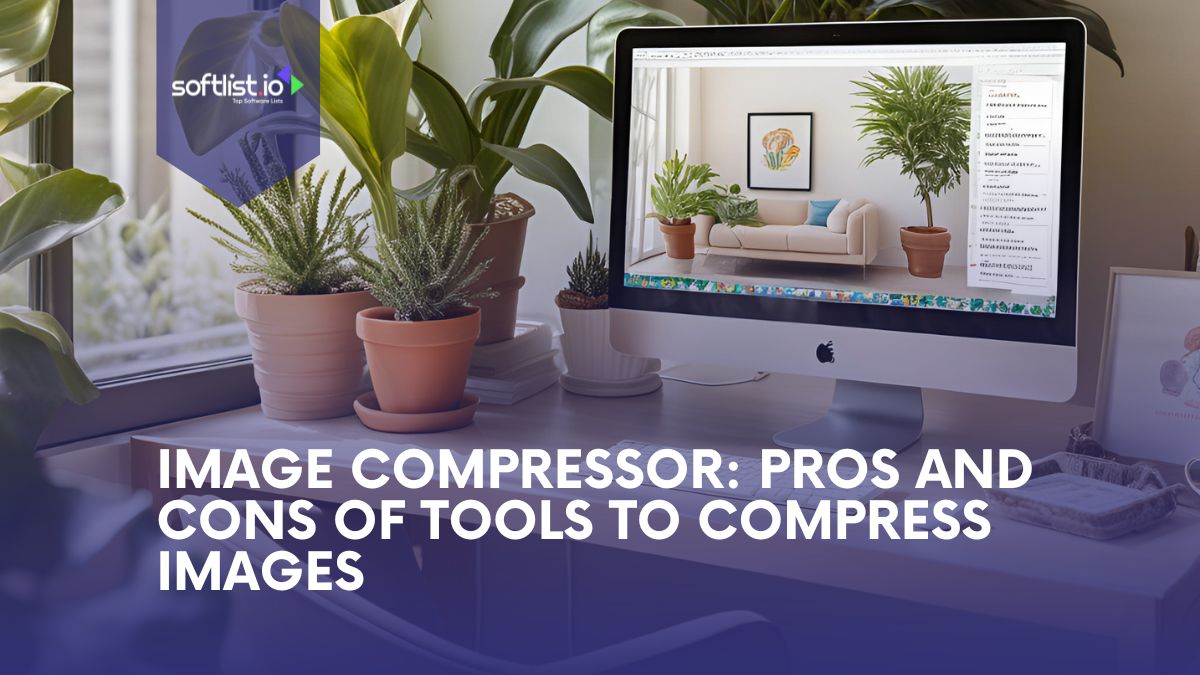When working with Image Compression Tools and digital content, ensuring your images are both visually appealing and optimized for performance is crucial. Image compressor tools provide a reliable solution to reduce file sizes while retaining quality. Using techniques like lossy compression, these tools help minimize storage needs and improve website load times.
Whether you need an optimizer for quick adjustments, a resizer to fit specific dimensions, or a minifier to reduce file size further, these tools have you covered. You can compress your images in formats like JPEG and PNG while preserving much of their original file’s clarity. Simply upload your images, let the tool process them, and download optimized images with minimal visible differences.
Read on to explore the pros and cons of these tools to compress images, including how compressing JPG files can enhance your digital strategy.
Key Takeaways
- Variety of Formats Supported
Most image compressor tools allow you to work with multiple formats, such as PNG, JPG, GIF, and WEBP. If you’d like to compress a specific type of file, these tools can handle different formats seamlessly, making them versatile for various needs. - Batch Uploads for Efficiency
Many tools let you upload up to 20 images at once, saving time when managing large files. Whether you want to compress images for a website or social media, batch uploads streamline the process and help maintain productivity. - Balancing Compression and Quality
While compressing image files, maintaining image quality is a priority. Some tools provide advanced options to resize and compress JPEG images without noticeable degradation, offering effective optimization for both aesthetics and performance. - Ideal for File Size Optimization
Image compressor tools are essential for reducing load times on websites and conserving storage space. Whether you want to compress images to optimize your website’s performance or resize them for faster sharing, these tools are invaluable for enhancing digital content.
What are Image Compression Tools?
Image compression tools are programs built to reduce the size of your images. Images are one of the most significant assets on your website. They add color and visual appeal to your site but also take up a lot of space. If you have too big images, it can speed up your website, which is good for both user experience and SEO.
That’s where image compression tools come in! These tools will help you shrink those image files to take up less space on your server and your website visitor’s devices.
Image compression is a technique that reduces the number of bits needed to represent an image. The fewer bits it takes to store an embodiment, the smaller it will be on disk or in memory. But don’t worry – this doesn’t affect how well it looks; most people can’t tell the difference between a compressed photo and one that hasn’t been compressed!
There are two main types of compression: lossless and lossy. Lossless compression does not change any data from its original form; it simply removes redundant information so that fewer bytes are required to store them (e.g., JPEG).
Many different types of image compression tools are available online today, but not all are good quality. Some are free, while others cost money to use. You should always try out any image compression tool before you buy it or use it on your website, just in case of any problems with the program itself.
How Can Tools to Compress Images Help You?
Tools to compress images are invaluable for anyone looking to enhance their digital content efficiently. They allow you to easily optimize large images for faster loading times and improved performance on websites or social media platforms. Many online tools support a variety of formats, including PNG formats, ensuring versatility for different file types.
A reliable free tool often gets the job done by offering essential features such as bulk processing, which saves time when working with multiple files at once. The compression process is designed to reduce file sizes without visible quality loss, maintaining the integrity of your visuals. Some tools even include extra features, like resizing or format conversion, to streamline your image processing needs.
Additionally, many online tools ensure user convenience and privacy by ensuring uploaded images are deleted automatically after processing. Whether you’re a professional needing an efficient solution or a casual user, these tools simplify the task of optimizing images, making it easy to create high-performing content.
PROS
Faster uploads.
Image compression tools are essential for any website displaying numerous pictures, especially on the front page, where visual appeal significantly impacts user experience. These tools work by reducing the file size of images while maintaining their quality, ensuring faster load times and smoother website performance.
By optimizing images, you enhance your site’s speed and improve its ranking in search engines, contributing to a better user experience and higher engagement.
Reduced bandwidth usage.
Most people use image compression tools to manage and optimize their website’s performance, particularly when working with a shared hosting plan that comes with limited bandwidth. These tools are invaluable for reducing bandwidth usage, which is crucial for maintaining a smooth and efficient user experience.
By compressing images and reducing their file size, fewer bytes need to be transferred when someone visits your website. This reduction directly translates to faster page load times, ensuring visitors can access content quickly without delays.
Easier sharing of photos with friends and family.
The main reason why people use photo compression software is to share their photos online. Sharing small pictures is easier because they do not take much time to load on your browser. This makes the whole process faster than you think. You don’t have to wait for long minutes to see these pictures on your screen.
The only thing that can make this process even faster would be if these pictures were compressed into smaller sizes so that they could be downloaded faster by your computer or device.
It saves a lot of time.
Tools to compress images can save a lot of time by streamlining the process of optimizing image files for websites, social media, or other digital platforms. With features like bulk compression and drag-and-drop functionality, these tools allow users to process multiple images simultaneously, eliminating the need for manual adjustments.
Advanced options, such as automated resizing and format conversion, further speed up the workflow by providing ready-to-use outputs in just a few clicks. By reducing the file size without compromising quality, these tools help users focus on other critical tasks while ensuring their images are web-ready in a fraction of the time.
CONS
They can be expensive.
Some tools to compress images can be expensive, especially premium software or platforms offering advanced features. These tools often require a subscription or one-time purchase, making them a costly option for individuals or small businesses with limited budgets. While free alternatives exist, they may lack the efficiency, bulk-processing capabilities, or high-quality output provided by paid versions.
For users handling large-scale projects or requiring consistent professional results, investing in expensive tools might be necessary, but it’s essential to evaluate whether the features justify the cost.
Quality Loss.
While tools to compress images are designed to reduce file sizes efficiently, they can sometimes result in a loss of quality. This occurs when high levels of compression are applied, which may remove fine details or reduce the sharpness of an image.
Lossy compression methods, in particular, prioritize minimizing file size over preserving every aspect of the original image’s quality. It is important to balance compression settings to ensure the file is small enough for quick loading while maintaining acceptable visual fidelity for its intended use.
Large File Size.
Tools to compress images are designed to reduce file sizes, but paradoxically, the software or platform itself can sometimes have a large file size. Advanced image compression tools with extensive features, such as batch processing, multiple format support, and high-quality algorithms, often require more storage space on a device.
For users with limited storage or slower systems, this can pose challenges, especially when the software includes additional resource-intensive functionalities. Online compression tools can mitigate this issue by eliminating the need for downloads, but they may require a stable internet connection for effective use.
Poor Support for PNGs
Some tools to compress images may offer poor support for PNG files, which can be a limitation for users working with this widely-used format. PNG images often require specialized compression techniques to maintain their transparency and high-quality details, but not all tools are optimized for this task.
As a result, the compressed PNGs may lose clarity, become distorted, or fail to retain transparency, making them unsuitable for professional use. To address this, users should select tools specifically designed to handle PNG files effectively, ensuring the desired balance between reduced file size and preserved quality.
Conclusion
Using the right image optimizer can make a significant difference in the quality and performance of your visuals. Whether you’re working on an online image for a website or need to prepare files for sharing, an optimizer tool or shrinker can help you achieve the perfect balance between size and quality.
Compression also allows you to reduce the maximum size of your files while maintaining visual appeal, and some tools even enable you to convert images into more efficient formats.
Ready to enhance your workflow and improve your content? Explore an optimizer tool that suits your needs, whether you’re looking to shrink files individually or compress them into a convenient zip file. Don’t let oversized images slow you down—start optimizing today!
You can read our other informative blogs to learn more about image compression tools and fill in the form to subscribe to enjoy the hottest deals and discounts on selected software!
FAQ
What is an online image compressor and how does it work?
An online image compressor is a tool that reduces the file size of images, such as JPEG, PNG, GIF, and other formats, by using various compression techniques. It works by removing unnecessary metadata and using lossy or lossless algorithms to decrease image size without significantly affecting quality.
How can I compress JPEG and PNG images fast?
You can compress JPEG and PNG images quickly by using online platforms like TinyPNG or Compressor.io. These tools allow you to upload your images and apply lossy optimization to reduce file size efficiently.
Does compressing images online affect their quality?
Compressing images online can affect their quality, especially when using lossy compression. However, many online tools offer the best compression with minimal quality loss, allowing you to maintain a balance between reduced file size and image clarity.
What image formats can I compress using an online image compressor?
Most online image compressors support a variety of image formats, including JPEG, PNG, GIF, SVG, and WEBP files. This flexibility allows you to optimize images across different formats easily.
Can I reduce the file size of images for free using these tools?
Yes, many online image compressors allow you to reduce the file size of images for free. They provide a convenient and cost-effective way to optimize images without the need for expensive software or plugins.
What is the benefit of using lossy compression?
Lossy compression significantly reduces the file size by eliminating some of the image data. This is beneficial for web use where reduced load times are crucial. Although it may cause slight quality loss, the efficiency in size reduction often outweighs the drawbacks.
How do I upload a PNG file for compression?
To upload a PNG file for compression, you can use the drag-and-drop feature available on most image optimization websites. Simply select your PNG file, drag it into the designated area on the site, and the tool will handle the compression process for you.
What is the difference between lossy and lossless compression?
Lossy compression reduces file size by permanently removing some data, which may slightly reduce quality. Lossless compression, on the other hand, reduces file size without any quality loss by compressing data more efficiently. The choice between the two depends on your need for quality versus file size reduction.
Are there any tools that allow for image resizing as well as compression?
Yes, many online optimizers offer both image resizing and compression features. These tools allow you to adjust the dimensions of your images while simultaneously reducing their file size, providing a comprehensive solution for image optimization.
How can I ensure that images are compressed without visible quality loss?
To compress images without visible quality loss, use tools that offer advanced lossy optimization techniques. These tools are designed to maintain visual quality while maximizing file size reduction, ensuring your images remain clear and sharp.






